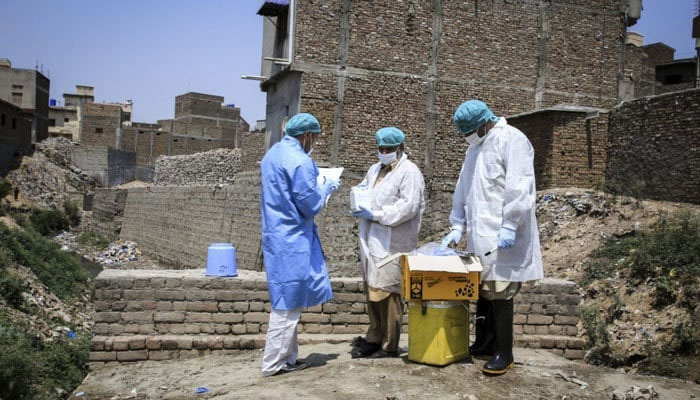Poliovirus found in sewage samples of Islamabad, four provinces
These new detections take the total number of positive environmental (sewage) samples in Pakistan in 2024 to 46
ISLAMABAD: The regional reference laboratory for polio eradication at the National Institute of Health (NIH), Islamabad confirmed the detection of Type-1 Wild Poliovirus (WPV1) in 12 environmental (sewage) samples collected in February 2024, including two from district Karachi Keamari and one each from districts Okara, Karachi Central, Hyderabad, Jacobabad, Sukkur, Kohat, Peshawar, Sibi, Quetta and Islamabad.
In Islamabad, the environmental sample was collected on February 14, 2024 from the ‘Sabzi Mandi’ environmental sample collection site, which is the first positive sample from district Islamabad this year. The previous positive sample from Islamabad was collected on December 12, 2023.
The isolated virus is classified as YB3A cluster and 99.89 percent genetically linked to the virus detected in an environmental sample in Karachi Malir on February 12, 2024.
In Punjab’s Okara district, the environmental sample was collected on February 19, 2024 from the ‘Okara Urban’ environmental sample collection site, which is the first positive sample from district Okara since the inception of this site. The isolated virus is classified as YB3A cluster and 99.89 percent genetically linked to the virus detected in an environmental sample in Karachi South on December 4, 2023.
In Karachi, the environmental samples were collected from the ‘Orangi Nala’ and Muhammad Khan Colony environmental sample collection sites in district Keamari. The isolated viruses were classified as YB3A cluster and genetically linked to the viruses detected in environmental samples in Karachi South and Gadap in district East in December 2023.
Similarly, in Karachi Central, the environmental sample was collected on February 15, 2024 from the ‘Haji Mureed Goth’ environmental sample collection site. This is the second positive sample from district Karachi Central this year.
In Hyderabad, the environmental sample was collected on February 13, 2024 from the ‘Jacob Pumping Station’ environmental sample collection site, which is the second positive sample from district Hyderabad this year.
While in Jacobabad, the environmental sample was collected on February 13, 2024 from the ‘Saddar Pumping Station’ environmental sample collection site, which is the first positive sample from district Jacobabad this year.
In Sukkur, the environmental sample was collected on February 13, 2024 from the ‘Makka Pumping Station’ environmental sample collection site, which is the second positive sample from district Sukkur this year.
Polio virus was also detected in Khyber Pakhtunkhwa, where it was found in the sewage of Kohat, from where the environmental sample was collected on February 13, 2024 from the ‘Faqirabad’ environmental sample collection site. This is the first positive sample from district Kohat this year.
In Peshawar, the environmental sample was collected on February 13, 2024 from the ‘Hayatabad 1 & 2 Tributary of Naray Khuwar,’ which is the fifth positive sample from district Peshawar this year.
In Balochistan’s Sibi district, the environmental sample was collected on February 19, 2024 from the ‘Main Ganda Nala’ environmental sample collection site, which is the second positive sample from district Sibi this year.
Similarly in Quetta, the environmental sample was collected on February 20, 2024 from the ‘Jatak Killi and Takhthani’ environmental sample collection site, which is the fifth positive sample from district Quetta this year.
These new detections take the total number of positive environmental (sewage) samples in Pakistan in 2024 to 46.
-
 Selma Blair Explains Why Multiple Sclerosis 'isn't So Scary'
Selma Blair Explains Why Multiple Sclerosis 'isn't So Scary' -
 Will Smith Surprises Wife Jada Pinkett With Unusual Gift On Valentine's Day
Will Smith Surprises Wife Jada Pinkett With Unusual Gift On Valentine's Day -
 Shamed Andrew Has Paid Royal Favours With ‘national Scandal’
Shamed Andrew Has Paid Royal Favours With ‘national Scandal’ -
 Prince William Ticked Off By How Andrew ‘behaved With Staff’
Prince William Ticked Off By How Andrew ‘behaved With Staff’ -
 Prince William Questions Himself ‘what’s The Point’ After Saudi Trip
Prince William Questions Himself ‘what’s The Point’ After Saudi Trip -
 James Van Der Beek's Friends Helped Fund Ranch Purchase Before His Death At 48
James Van Der Beek's Friends Helped Fund Ranch Purchase Before His Death At 48 -
 King Charles ‘very Much’ Wants Andrew To Testify At US Congress
King Charles ‘very Much’ Wants Andrew To Testify At US Congress -
 Rosie O’Donnell Secretly Returned To US To Test Safety
Rosie O’Donnell Secretly Returned To US To Test Safety -
 Meghan Markle, Prince Harry Spotted On Date Night On Valentine’s Day
Meghan Markle, Prince Harry Spotted On Date Night On Valentine’s Day -
 King Charles Butler Spills Valentine’s Day Dinner Blunders
King Charles Butler Spills Valentine’s Day Dinner Blunders -
 Brooklyn Beckham Hits Back At Gordon Ramsay With Subtle Move Over Remark On His Personal Life
Brooklyn Beckham Hits Back At Gordon Ramsay With Subtle Move Over Remark On His Personal Life -
 Meghan Markle Showcases Princess Lilibet Face On Valentine’s Day
Meghan Markle Showcases Princess Lilibet Face On Valentine’s Day -
 Harry Styles Opens Up About Isolation After One Direction Split
Harry Styles Opens Up About Isolation After One Direction Split -
 Shamed Andrew Was ‘face To Face’ With Epstein Files, Mocked For Lying
Shamed Andrew Was ‘face To Face’ With Epstein Files, Mocked For Lying -
 Kanye West Projected To Explode Music Charts With 'Bully' After He Apologized Over Antisemitism
Kanye West Projected To Explode Music Charts With 'Bully' After He Apologized Over Antisemitism -
 Leighton Meester Reflects On How Valentine’s Day Feels Like Now
Leighton Meester Reflects On How Valentine’s Day Feels Like Now




